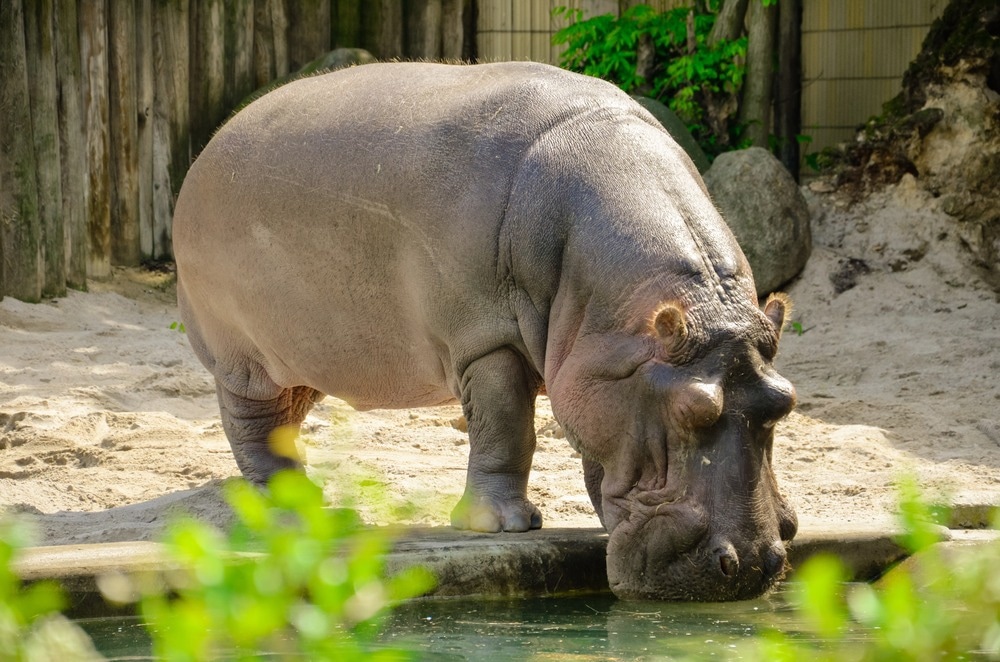A recent Emerging Infectious Diseases study investigated the death of a hippopotamus at a zoo in Hanoi, Vietnam. Interestingly, this study detected the presence of the severe acute respiratory syndrome coronavirus-2 (SARS-CoV-2) virus in the hippopotamus. SARS-CoV-2 is the causal agent of the ongoing coronavirus disease 2019 (COVID-19) pandemic.
 Study: SARS-CoV-2 Infection in a Hippopotamus, Hanoi, Vietnam. Image Credit: Sinellia/Shutterstock
Study: SARS-CoV-2 Infection in a Hippopotamus, Hanoi, Vietnam. Image Credit: Sinellia/Shutterstock
The case study
A 20-year-old female hippopotamus was treated for lethargy, depression, and reduced appetite at a zoo in Hanoi, Vietnam, on December 4, 2021. Based on the clinical symptoms, veterinary doctors started administering antimicrobial drugs to treat the sick hippopotamus. This hippopotamus became anorexic after six days of onset of clinical symptoms and eventually died seventeen days later.
The veterinary staff at the zoo conducted an autopsy and found the prevalence of severe pneumonia. They collected tissue samples from the lung, spleen, liver, intestine, and blood and sent them to the National Institute of Veterinary Research in Hanoi for further investigation of microbial diseases.
Based on the protocol provided by the World Health Organization (WHO), the samples were analyzed using real-time PCR to detect SARS-CoV-2. The liver, lung, spleen, and intestine samples tested positive with varying cycle threshold (Ct) values. For instance, Ct values for lungs were 26.67, spleen 33.53, liver 31.8, and intestine 36.96. These tissues were not studied histologically.
Viruses were extracted from the infected tissues and were confirmed to be SARS-CoV-2 by real-time PCR. The authors temporarily designated this virus as SARS-CoV-2/hippo/zoo/Vietnam/2021.
Characterization of SARS-CoV-2 isolated from the dead hippopotamus
The isolated SARS-CoV-2/hippo/zoo/Vietnam/2021 was characterized and compared with SARS-CoV-2 isolated from three infected humans. The purified PCR products were sent to 1st BASE Company, Singapore, to sequence the 599–602-bp nucleotide of the conserved RNA-dependent RNA polymerase (RdRp) genome. This sequence was later submitted to GenBank.
Multiple alignments (ClustalW) were performed using the genomic sequence of the dead hippopotamus and three human SARS-CoV-2 strains. This analysis was conducted with representative nucleotide sequences of SARS-CoV-2 and betacoronaviruses, which were obtained by GenBank.
A phylogenetic analysis was conducted using the MEGA-X software, based on the maximum-likelihood method with the best-fit model and 1,000 bootstrap replicates. This analysis revealed that genomic sequences obtained from the dead hippopotamus and three human COVID-19 patients were of the SARS-CoV-2 virus. A Bayesian maximum-clade credibility host discrete traits tree was constructed using BEAST.
Study insights
The authors failed to determine the exact source of the infection. This is because the zoo was open to the public; hence, an infected visitor or zoo staff could have transmitted the virus. It must be noted that all zoo staff were required to wear facemasks, uniforms, and gloves and disinfect their boots before taking care of zoo animals. However, these biosecurity measures could not prevent virus transmission from infected humans to animals.
In the future, zoos must routinely monitor the health status of their staff to prevent virus transmission from humans to animals. In addition, zoo animals must be regularly monitored for early detection of infection by regularly analyzing nasal or oral swab specimens and fecal samples.
The authors emphasized the importance of developing comprehensive monitoring systems for SARS-CoV-2 in animals. The current study contributed to the existing knowledge of the virus host range. Whole-genome sequencing could provide information related to SARS-CoV-2 lineage, which will help determine transmission pathways.